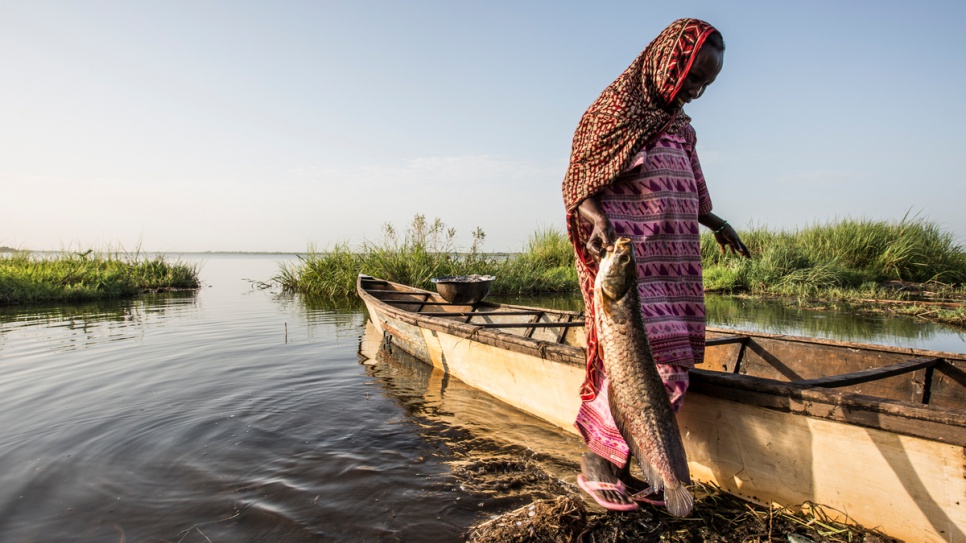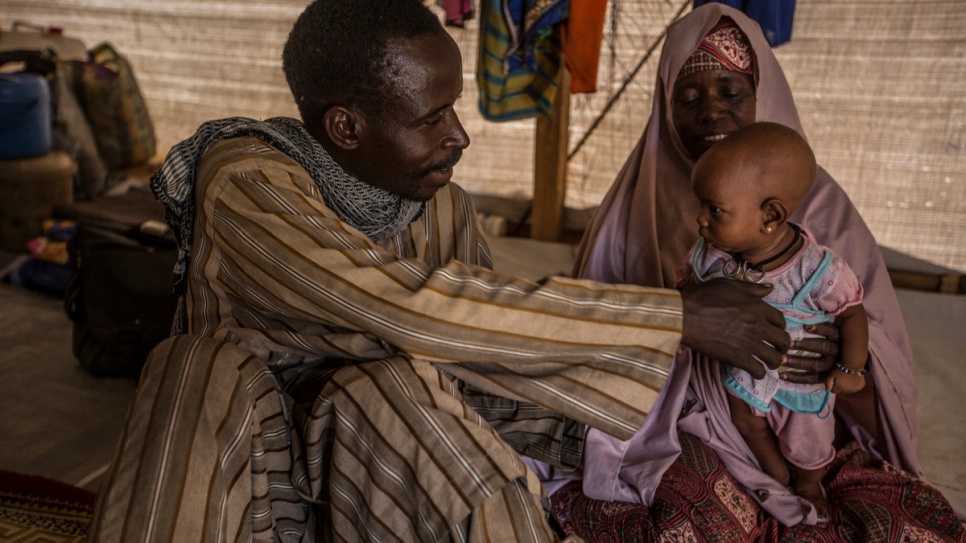UNHCR provides a safety net for Nigerians at lakeside camp in Chad
Refugees and host community struggle to cope after thousands cross the border in the wake of attacks by Boko Haram militants in north-eastern Nigeria.
Nigerian refugee Hawali Oumar gathers up his net after a night fishing on Lake Chad, Chad, in November 2016.
© UNHCR/Oualid Khelifi
Nigerian refugee Hawali Oumar woke up to the sound of gunfire and the sight of his neighbourhood in flames when Boko Haram attacked his home town of Baga in north-eastern Nigeria.
The 43-year-old fisherman desperately looked for members of his family and discovered his father had been shot dead. Despite being unable to round up all his offspring, Oumar fled across the border to safety in Chad.
“It was heartbreaking when Boko Haram attacked our homes,” he said. “We scattered with nothing but the clothes we had on. I learnt later that more than 10 people in my extended family were killed. Some of the survivors amongst us ended up in Cameroon, others in Chad, but it took over a year to re-establish contact with everybody.”
More than 5,000 Nigerians have found refuge In Dar es Salam camp on the Chadian side of Lake Chad after fleeing horrific violence in December 2014. A total of 2.4 million people in north-eastern Nigeria, Cameroon, Chad and Niger have been displaced as a result of the Boko Haram insurgency.
“It was heartbreaking when Boko Haram attacked our homes."
Thousands of families are separated and unaware of the whereabouts of loved ones. Oumar was relieved to be reunited two months ago with his 18-year-old daughter Miriam. “I never thought I was going to see her again, but here we are all together,” he said. “She is back at school and we are all hoping to gradually restore an ordinary life.”
While the Chadian army and a joint regional task force continue to combat Boko Haram in provinces around the lake, UNHCR, the UN Refugee Agency, is focusing on protection, shelter and education. This involves extending livelihood programmes and enlarging the pool of refugees who have benefited from assistance to resume economic activity and achieve self-reliance.
The livelihood programmes consist of providing the means for lake fishermen to resume work. Beneficiaries have so far received canoes, nets and basic fishing equipment.
The influx of refugees has stabilized since last year, but the economy in the lake area has been dramatically affected. The closure of the lake borders with the other three countries of the basin – Nigeria, Cameroon and Niger – has depressed fishing, herding and farming, and brought regional trade almost to a standstill. These are vital sectors in and around Bagasola, the Chadian town that hosts Dar es Salam camp and most of the refugees who have fled into Chad to escape the Boko Haram threat in Nigeria.
"I can’t go back home,” said Oumar. "I lost my father and many others in the attacks. I think about it all the time. It feels like it happened just yesterday."
“Now, even if I am told peace is gradually returning to my village, I prefer to stay in Chad. I am afraid to go back after everything I saw and experienced.”
Because of the region’s volatility and little prospect of the refugees returning home in the near future, UNHCR hopes to step up livelihood programmes for refugees in the camp and for the host community in and around Bagasola.
So far, UNHCR has assisted 150 households with fishing boats and materials. Beneficiaries make an average of US$10 a week which helps sustain their families. However, the programme covers only 8 percent of refugees in the camp and around Bagasola.
"I lost my father and many others in the attacks. I think about it all the time."
More funding is needed so that more fishermen, farmers, herders and traders from the refugee and local communities can be included.
Oumar is one of the beneficiaries. “I am grateful to be given the tools to resume my work,” he said. “I am a fisherman, so if I could survive fishing in Nigeria, I can do it here in Chad. But if we had more manpower in this programme, bigger nets and better equipment, we would quickly grow independent of aid, and lift the entire town, refugees and locals together, from economic depression.”
For UNHCR and its partners, providing livelihood support so that the limited resources around Bagasola are shared out is essential to achieving sustainability and cohesion between refugees and the host community. A survey has been conducted to log skill sets and the previous professions of refugees.
According to Docteur Koussoumbi, livelihood associate officer at the UNHCR office in Bagasola, the self-reliance programme has been successful for the 150 households that have benefited so far. They now have expertise in all aspects of fishing, from operating the equipment to selling and distributing the produce.
“I am grateful to be given the tools to resume my work."
“The challenge now is twofold,” he said. “First, to enroll more households into the programme and provide them with basic canoes and tools to jump-start their activities. Second, to meet the demands of existing beneficiaries whose operations have been going very well, hence the need for bigger boats and nets to increase their output and strive towards full self-reliance. We are looking at these options, but we are facing significant funding constraints.”
Climate change is also having a profound effect on communities around Lake Chad, including refugees. Because of the vulnerability of the lake's environment and fluctuation in rainfall, livelihood programmes are a priority for the humanitarian community in both policy and funding.
The surface area of the lake has shrunk to less than one twentieth of its size in the 1960s and invasive plant species cover about 50 percent of what is left. The vegetation takes root on the lake floor during dry seasons and when the water level rises after rainfall, it blocks off the shore, preventing communities from sailing their boats.
“This is a new worrying phenomenon,” said Koussoumbi. “It is becoming more difficult for fishermen to go out in the lake. The plants also break the nets and disrupt fishing activities."






